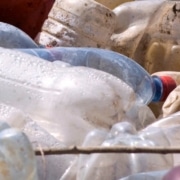What’s the deal with the Plastic Soup again?
March 15 2024 That’s what readers of news site nu.nl on their comment platform Nujij were wondering. In a recent […]
21 July 2021
Much of the plastic sold in the Netherlands originate from Chemelot, the largest industrial complex in the country. According to the company, sustainability is a high priority. For example, since last year, the company has been participating in Operation Clean Sweep, a worldwide program to eliminate plastic granules and litter from the environment. So from raw material suppliers to products, transporters, and recyclers.
That all sounds wonderful, but meanwhile, last year, Chemelot applied for and received a permit to discharge residual waste streams into the Maas for seven years. The permit application acknowledges that (in addition to numerous other substances) these residual streams also contain 468 μg/l of polymers (microplastics). This amounts to a discharge of at least 14,040 kg per year of minuscule particles of plastic. These particles have been floating around in an industrial water treatment plant where they have come into direct contact with dangerous chemicals and can absorb them. Moreover, it is recognized that the effect of these polymers on the ecology in surface water and on drinking water production from the Maas is not yet sufficiently clear: “(Micro and Nanoplastics) hardly break down in the environment and are often poorly to very poorly water-soluble. The generic policy for this group of substances is aimed at prevention… Due to their physical characteristics, microplastics can negatively influence specific functions in aquatic organisms, such as respiration, movement, or food intake. Furthermore, they can have toxic effects, especially through additives present in microplastics or through chemicals that are adsorbed by microplastics in the (aquatic) environment,” according to the permit.
Therefore, Chemelot is required to investigate these effects. However, they do not have to return with a report until January 2024.
“So for the coming 2.5 years, the chemical industrial complex may continue to discharge plastic compounds into our (drinking) water undisturbed, with strong suspicions about their harmfulness to humans and the environment. That is the world upside down,” says Maria Westerbos, director of Plastic Soup Foundation.
That is why Plastic Soup Foundation is making an urgent request to Chemelot to respond to this statement about the dumping and is also taking exploratory steps to see what can be done about it.
Poor Maas…
March 15 2024 That’s what readers of news site nu.nl on their comment platform Nujij were wondering. In a recent […]
The first Impact Fair is Europe’s largest Impact Experience. An interactive ‘immersive’ experience of impactful examples.
The waste-export to countries outside of the EU has been restricted The Netherlands is against a carpet ban on shipping of plastic waste.
The waste-export to countries outside of the EU has been restricted The Netherlands is against a carpet ban on shipping of plastic waste.

 Industry must not sabotage the ban on UV-328
Industry must not sabotage the ban on UV-328